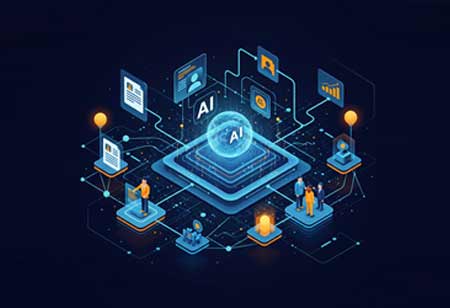THANK YOU FOR SUBSCRIBING
Be first to read the latest tech news, Industry Leader's Insights, and CIO interviews of medium and large enterprises exclusively from Hrtech Outlook
THANK YOU FOR SUBSCRIBING

By
HR Tech Outlook | Thursday, August 28, 2025
Stay ahead of the industry with exclusive feature stories on the top companies, expert insights and the latest news delivered straight to your inbox. Subscribe today.
The global talent landscape has undergone a dramatic transformation, with organizations under pressure to hire faster, smarter, and more inclusively. Traditional recruitment models, reliant on human intuition and manual processes, are proving inefficient in the face of modern workforce demands. Enter AI-powered talent acquisition and optimization, a data-driven revolution that is changing how businesses attract, assess, and retain talent. From sourcing candidates to workforce planning, artificial intelligence is streamlining workflows, removing bias, improving candidate experience, and helping HR leaders align talent strategies with long-term business goals.
AI Integration and Emerging Market Trends
Several market factors are fueling the adoption of AI in talent acquisition and workforce optimization. It includes the global shortage of skilled labor, the growing volume of job applications, the rise of remote work, and increased pressure on HR departments to deliver results with fewer resources. Companies are no longer merely searching for candidates—they’re seeking the right talent with the right skills at the right time. It requires intelligent systems that can analyze vast amounts of data, predict future workforce needs, and personalize the recruitment experience. AI is being implemented in multiple stages of the talent lifecycle.
Automated sourcing tools scan resumes, portfolios, and public data to identify qualified candidates faster than any recruiter. Natural Language Processing (NLP) algorithms evaluate job descriptions and match them with candidate profiles based on skills, experience, and potential rather than mere keyword matches. Chatbots conduct initial screenings and schedule interviews, enhancing responsiveness and reducing hiring time. By analyzing patterns in employee data, AI helps HR teams determine which roles are at risk of turnover or which candidates are likely to succeed based on performance histories.
The strategic view of talent planning is critical for large enterprises and high-growth startups alike. Another emerging trend is the use of AI to promote diversity, equity, and inclusion (DEI). By anonymizing resumes and eliminating unconscious bias from screening and interviewing, AI platforms ensure that candidates are evaluated fairly based on merit. Sentiment analysis and ML models can even assess the inclusivity of job descriptions, improving candidate perception and employer branding. The analytics empower data-driven decision-making and help align talent strategies with broader business objectives, such as digital transformation or market expansion.
Applications and Business Value Across the Talent Lifecycle
AI-driven solutions are now embedded across all key stages of talent acquisition and optimization. In recruitment, platforms like applicant tracking systems (ATS) and candidate relationship management (CRM) tools are becoming intelligent, enabling recruiters to manage pipelines, nurture passive talent, and automate repetitive tasks. It increases recruiter productivity and allows human decision-makers to focus on strategic hiring decisions. During the assessment phase, AI enhances candidate evaluations through gamified skill tests, video interview analysis, and personality assessments.
Algorithms assess not only what candidates say, but how they say it—tone, body language, and speech patterns are analyzed to measure confidence, emotional intelligence, and cultural fit. It can reduce mismatches, leading to higher retention rates and improved team dynamics. AI supports onboarding and employee development. In workforce optimization, AI helps managers allocate talent more effectively, balance workloads, and plan succession. For HR departments, AI tools offer real-time dashboards, providing insights into recruitment metrics such as time-to-hire, cost-per-hire, and candidate satisfaction.
Challenges and Solutions for Scalable Implementation
Despite the vast potential of AI in talent management, challenges remain. One of the most pressing concerns is data privacy and compliance. AI systems rely heavily on personal data, raising questions around consent, storage, and usage. Ensuring compliance with GDPR, HIPAA, and other regulations is essential. Companies must audit their AI systems regularly, use diverse datasets, and implement explainable AI models that make decision-making processes visible and accountable. Many HR professionals are unfamiliar with AI tools or skeptical of their value.
Successful implementation requires strong leadership, upskilling programs, and a shift in mindset—from viewing AI as a replacement for human judgment to a complement that enhances human decision-making. Collaboration between HR, IT, and data science teams is critical to ensure smooth deployment and meaningful outcomes. Cost can also be a deterrent for small and mid-sized enterprises (SMEs). The growing availability of cloud-based, subscription-model AI tools is reducing entry barriers. The scalable solutions allow organizations to start small, automating one stage of the hiring process, and expand as they realize ROI.
AI in talent acquisition improves hiring metrics and transforms company culture. Employees feel more valued when career paths are tailored and opportunities are transparent. Better hiring decisions reduce turnover and training costs, while a diverse and inclusive workforce drives innovation. In the long run, AI becomes a strategic asset, turning talent acquisition from a reactive function into a forward-looking, business-aligned engine. AI-powered talent acquisition and workforce optimization are no longer futuristic concepts; they are essential tools in navigating today’s complex talent landscape.



